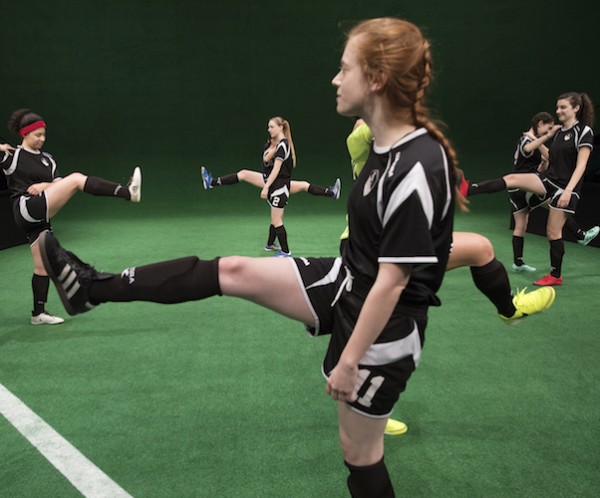Theater Review: “The Wolves” — Theater of the Prosaic
Perhaps the theatre of millennials will resemble Reality TV, resistant to suggestive metaphor and the rewards of complex narration.
The Wolves by Sarah DeLappe. Directed by Lila Neugebauer. At the Mitzi E. Newhouse Theater, 150 West 65th Street, Lincoln Center Theater, New York, through January 7.

A scene from the Lincoln Center Theater production of “The Wolves” by Sarah DeLappe. Photo: Julieta Cervantes.
By Mary Paula Hunter
Sarah DeLappe’s new play, The Wolves, is immediately engaging. Lights come up on a circle of high school girl soccer players, stretching in synch as they argue, joke, and despair over everything from the merits of various feminine hygiene products to the horrors of the Pol Pot regime. “Genocide is senior year,” an upper classman reminds the group in a reproving tone.
DeLappe’s greatest gift is a near pitch-perfect ear for the shrieks, whispers, raves, and desperations of those still to shape (or figure out) an adult persona. The dramatist also exults in the disparate range of topics that seem to explode (simultaneously) through the brains of teenage girls. To observe that these females converse in cross currents, interrupting each other often, is an understatement. At times it feels as if we are in a forest of birds; the excellent actors in this Lincoln Center Theater production create a chorus that fills the stage.
In addition to the vocal pyrotechnics, there is quite a bit of lively dribbling as well as some high stepping soccer drills. But beyond the smooth staging of sports-like moves, the uniforms and, of course, the ever-present soccer ball, we learn next-to-nothing about how athletics, competition, or soccer shapes this group of girls. The setting of The Wolves could just as easily been a backstage at a high school play, gym class, or perhaps an endless sleepover.
To her credit, DeLappe populates the team with characters who are so well-drawn they defy stereotype. The best player is a ringer who lives in a yurt with her single mother, a travel writer who drags her kids to her assignments in far-flung destinations. “I haven’t been on a team before but I’ve played a lot,” she confesses to her jealous teammates. But, like the other characters in The Wolves, her emotional trajectory, her connection to the team, and her odd family life are left hanging like threads, untied and disconnected.
Without internal development among the girls or signs of conflict, beyond the petty squabbles and clashes among personalities, the dramatic power of The Wolves grows increasingly thin. DeLappe dabbles in theatrical themes: the corruption of an innocent (a weekend tryst goes wrong), the outsider as savant, and the breakdown of community (a player is killed while jogging, temporarily destroying the team’s cohesiveness). But she eschews revelation or even dramatic follow-through.
Perhaps the theatre of millennials will resemble Reality TV, resistant to suggestive metaphor and the rewards of complex narration. A recent production of Will Eno’s script Wakey, Wakey at the Signature Theatre comes to mind. Eno’s play about mortality recreates a man’s final hours — he sits in a wheelchair and reads lines from a stack of cards. Both The Wolves and Wakey, Wakey reduce consciousness to a tedious laundry list of half-realized thoughts and ambitions.
Of course Samuel Beckett, the brilliant champion of life on the edge, wouldn’t accept anything so tidy, even when his characters were looking over the edge of the abyss. His poetry was wrenching, and conjured up worlds beyond those on stage. In contrast, The Wolves and Wakey, Wakey never dare to venture into the poetic — they are mired in sociological details, never rising above the prosaic.
Mary Paula Hunter lives in Providence, RI. She’s the 2014 Pell Award Winner for service to the Arts in RI. She is a choreographer and a writer who creates and performs her own text-based movement pieces.
Tagged: Lila Neugebauer, Lincoln Center Theater, Mary Paula Hunter, Sarah DeLappe
